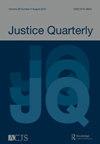非对称同情崩溃、附带后果与重返社会:一项实验
IF 2.1
1区 社会学
Q1 CRIMINOLOGY & PENOLOGY
引用次数: 5
摘要
摘要公众舆论对重返社会具有双重重要意义,因为它塑造了有犯罪记录的人必须面对的政策和耻辱环境。没有什么地方的政策和污名化环境比被判性犯罪的记录保持者更糟糕了。根据同情心崩溃(或精神麻木)的理论,并使用一项全国性调查的实验数据,我们研究了向公众通报被判性犯罪的记录持有者所面临的困难的效果,并将这些效果(或缺乏这些效果)与受害者话语的效果进行了比较。我们还将信息格式随机化:汇总/统计与个人叙述。我们发现,关于犯罪受害者痛苦的叙述对公众来说很重要——增加厌恶情绪、支持附带后果和污名化——但关于记录持有者痛苦的叙述则不然。最后,我们讨论了公共犯罪学家可以用来争取公众对渐进式刑事司法改革支持的替代沟通策略。本文章由计算机程序翻译,如有差异,请以英文原文为准。
Asymmetric Compassion Collapse, Collateral Consequences, and Reintegration: An Experiment
Abstract Public opinion is doubly important for reintegration, as it shapes both the policy and the stigma environments that people with criminal records must face. Nowhere are the policy and stigma environments bleaker than for record holders convicted of sex crimes. Drawing on the theory of compassion collapse (or psychic numbing) and using experimental data from a national survey, we examine the effects of informing members of the public about the hardships faced by record holders convicted of sex crimes, and we compare those effects (or the lack thereof) to the effects of victim discourse. We also randomize the information format: aggregate/statistical versus personal narratives. We find that narratives about crime victims’ suffering matter to the public—increasing aversive emotions, support for collateral consequences, and stigmatization—but narratives about record holders’ suffering do not. We conclude by discussing alternative communication strategies that public criminologists may use to garner public support for progressive criminal justice reforms.
求助全文
通过发布文献求助,成功后即可免费获取论文全文。
去求助
来源期刊

Justice Quarterly
CRIMINOLOGY & PENOLOGY-
CiteScore
6.90
自引率
6.20%
发文量
44
期刊介绍:
Justice Quarterly (JQ) is an official publication of the ACJS. JQ is a refereed, multi-disciplinary journal that publishes theoretical, empirical and interpretive studies of issues related to criminal justice. JQ is indexed in Criminology and Penology Abstracts, Police Science Abstracts, Criminal Justice Periodical Index, and Criminal Justice Abstracts. In the past decade, JQ has become a premier journal and it continues to be a major forum for criminal justice related scholarship, making it an essential part of any library"s holdings.
 求助内容:
求助内容: 应助结果提醒方式:
应助结果提醒方式:


